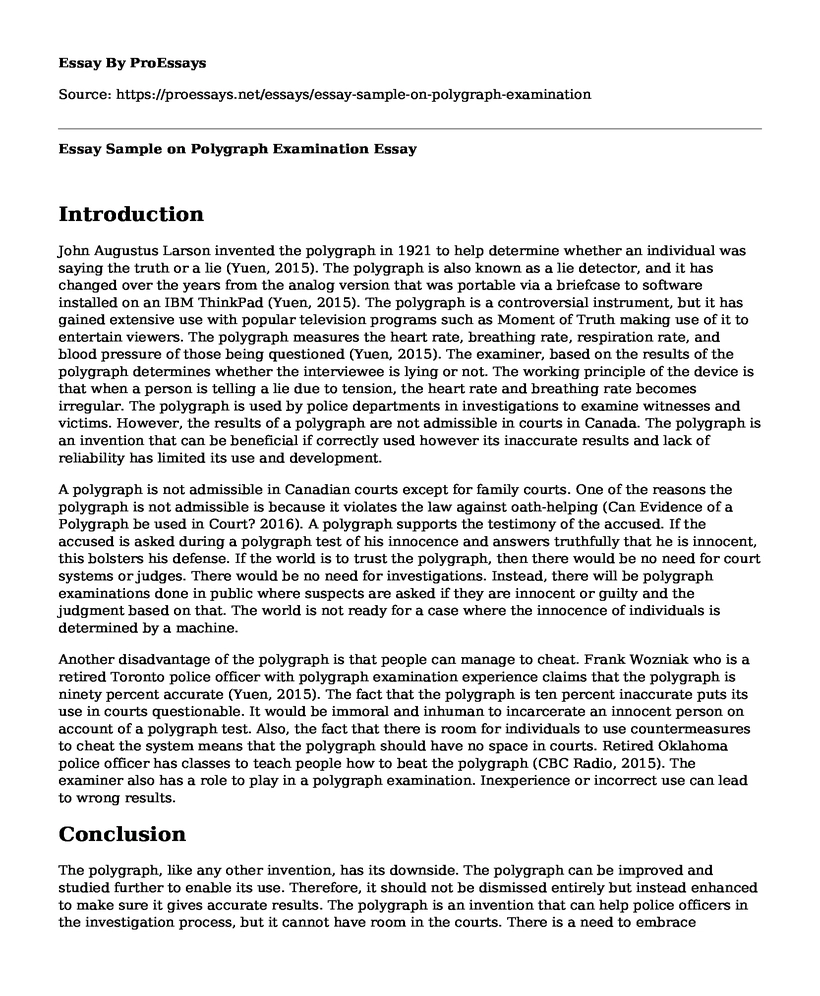Introduction
John Augustus Larson invented the polygraph in 1921 to help determine whether an individual was saying the truth or a lie (Yuen, 2015). The polygraph is also known as a lie detector, and it has changed over the years from the analog version that was portable via a briefcase to software installed on an IBM ThinkPad (Yuen, 2015). The polygraph is a controversial instrument, but it has gained extensive use with popular television programs such as Moment of Truth making use of it to entertain viewers. The polygraph measures the heart rate, breathing rate, respiration rate, and blood pressure of those being questioned (Yuen, 2015). The examiner, based on the results of the polygraph determines whether the interviewee is lying or not. The working principle of the device is that when a person is telling a lie due to tension, the heart rate and breathing rate becomes irregular. The polygraph is used by police departments in investigations to examine witnesses and victims. However, the results of a polygraph are not admissible in courts in Canada. The polygraph is an invention that can be beneficial if correctly used however its inaccurate results and lack of reliability has limited its use and development.
A polygraph is not admissible in Canadian courts except for family courts. One of the reasons the polygraph is not admissible is because it violates the law against oath-helping (Can Evidence of a Polygraph be used in Court? 2016). A polygraph supports the testimony of the accused. If the accused is asked during a polygraph test of his innocence and answers truthfully that he is innocent, this bolsters his defense. If the world is to trust the polygraph, then there would be no need for court systems or judges. There would be no need for investigations. Instead, there will be polygraph examinations done in public where suspects are asked if they are innocent or guilty and the judgment based on that. The world is not ready for a case where the innocence of individuals is determined by a machine.
Another disadvantage of the polygraph is that people can manage to cheat. Frank Wozniak who is a retired Toronto police officer with polygraph examination experience claims that the polygraph is ninety percent accurate (Yuen, 2015). The fact that the polygraph is ten percent inaccurate puts its use in courts questionable. It would be immoral and inhuman to incarcerate an innocent person on account of a polygraph test. Also, the fact that there is room for individuals to use countermeasures to cheat the system means that the polygraph should have no space in courts. Retired Oklahoma police officer has classes to teach people how to beat the polygraph (CBC Radio, 2015). The examiner also has a role to play in a polygraph examination. Inexperience or incorrect use can lead to wrong results.
Conclusion
The polygraph, like any other invention, has its downside. The polygraph can be improved and studied further to enable its use. Therefore, it should not be dismissed entirely but instead enhanced to make sure it gives accurate results. The polygraph is an invention that can help police officers in the investigation process, but it cannot have room in the courts. There is a need to embrace technology due to the efficiency and accuracy, but the polygraph is controversial with room for error. It is wrong to let the fate of a human being be decided by a machine.
References
Can Evidence of a Polygraph Test be used in Court (2016, October 5)? Provincial Court of British Columbia. Retrieved from http://www.provincialcourt.bc.ca/enews/enews-10-05-2016
CBC Radio (2015, May 9). Meet Doug Williams, the Ex-Cop Battling Polygraph Testing. Retrieved from https://www.cbc.ca/radio/day6/episode-232-the-changing-face-of-canada-s-politics-scientology-s-tax-exemption-free-range-parenting-more-1.3062201/meet-doug-williams-the-ex-cop-battling-polygraph-testing-1.3062210
Yuen, J, (2015, April 12).Fear the Examiner not the Polygraph. Toronto Sun. Retrieved from https://torontosun.com/2015/04/12/fear-the-examiner-not-the-polygraph/wcm/020cf4de-e22b-4efa-b3db-812fd303d128
Cite this page
Essay Sample on Polygraph Examination. (2022, Nov 13). Retrieved from https://proessays.net/essays/essay-sample-on-polygraph-examination
If you are the original author of this essay and no longer wish to have it published on the ProEssays website, please click below to request its removal:
- Burglary Laws in Arizona Essay
- High Cost of Health Care Essay
- The Ban on 3D Gun Blueprints Essay
- Research Paper on Automation Impact on OSHA Compliance
- False Memories in Eyewitness Testimonies - Essay Sample
- Essay Example on AMA Code Violation: Patient's Rights Disregarded
- The Pursuit of Freedom: The History of Racism in America - Essay Sample







